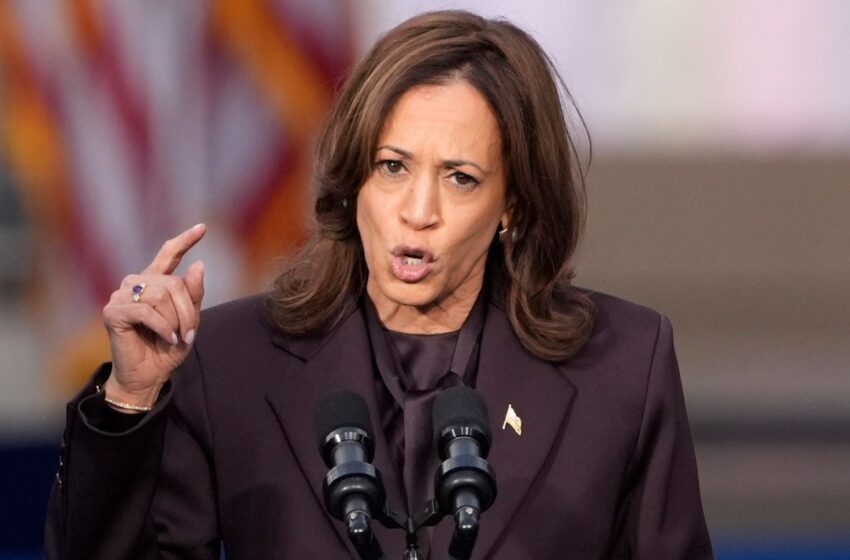Kamala Harris, Hillary Clinton… female US presidential candidates who lost election

Kamala Harris delivers her concession speech. Pic: AP
In the recently concluded 2024 US presidential election, Vice President Kamala Harris lost to Donald Trump, who reclaimed the presidency. Having defeated two women in 2016 and 2024, Harris and Clinton, this recent defeat indeed marks a significant political comeback for Trump, who had previously lost the 2020 election to Joe Biden.
According to a BBC report, Kamala Harris faced several significant challenges during her 2024 presidential campaign after stepping in as the Democratic nominee following President Biden’s withdrawal. One major issue was her limited preparation time, as she organised her campaign within just four months. Another obvious challenge was that Harris struggled to articulate how her policies would differ, particularly on key issues like the economy and immigration.
She also faced challenges in connecting with crucial voter groups, including Black, Latino, and young voters. As a result, people maintained she did not do her background work well, while her campaign focused heavily on attacking Donald Trump rather than clearly communicating her own vision for the country. These factors collectively contributed to her losing all seven swing states and ultimately leading to her defeat by Trump, who secured more than 270 votes as required.
According to reports from both BBC and CNN, Hillary Clinton also faced several challenges in her 2016 presidential campaign that were similar to those encountered by Kamala Harris in 2024. Both candidates struggled to differentiate themselves from their party’s previous administration, with Clinton finding it difficult to distance herself from Obama’s policies and Harris facing similar issues with Biden’s legacy.
Both women also had trouble connecting with key voter groups, particularly working-class and Latino voters.
Clinton’s campaign was criticised for neglecting crucial swing states, while Harris similarly underperformed in battleground areas.
Most obvious is that both candidates faced challenges related to their gender, with Clinton experiencing sexism and Harris confronting unique perceptions and criticisms as a female candidate.
READ ALSO
- Meet Patience Ndidi Key, Edo 2024’s only female guber candidate
- CrispNG’s maiden lecture: Women inclusion in Nigeria still low – Aisha Wakaso
- CrispNG, NFM partner to promote gender inclusion in Nigeria
- IWD 2024: Maryam Bukar, Amrah Aliyu… celebrating the heroics of young women in Nigeria
- Gender quotas in Nigeria: Genuine representation or tokenism?
Despite losing the 2024 presidential election, Kamala Harris also demonstrated significant leadership qualities that highlighted women’s progress in politics since the 1990s. As the first woman, Black person, and South Asian to serve as U.S. Vice President, Harris broke barriers and increased representation in high-level political positions.
Her campaign not only focused on critical issues like climate change and healthcare reform, it showcased women’s ability to address complex challenges. Harris built a diverse voter coalition and displayed resilience by stepping into the race even after Biden’s withdrawal.
Her candidacy increased visibility for women in leadership and addressed gender-specific issues in politics. Although unsuccessful, Harris’s efforts contributed to encouraging and normalising women in top political roles.
According to the UN Women and Inter-Parliamentary Union’s “Women in Politics 2023” Map, women held 26.5% of national legislative seats and 22.8% of ministerial positions globally as of 2023.
Though Harris lost the battle, several other women are currently serving as presidents in various countries, such as Droupadi Murmu in India, Xiomara Castro in Honduras, Dina Boluarte in Peru, Nataša Pirc Musar in Slovenia, Myriam Spiteri Debono Malta president elect, etc.
Despite evident progress in increased representation among heads of state, significant challenges persist. The report by UN Women – IPU noted that “More women are participating in political decision-making worldwide, but gender equality still has not been achieved.”
It noted also that these obstacles include online harassment, structural barriers, and cultural norms that impede women’s political participation and that the gender parity gap in politics remains substantial and that, It could take 130 years at the current rate of progress to achieve full gender parity in political representation globally.
The World Economic Forum’s Global Gender Gap Report 2023 also states that closing the overall gender gap will require 131 years at the current rate of progress.
These reports not only evidentially showed the reason Kamala Harris failed, but they also highlight the slow progress in achieving gender parity in politics and the significant challenges women face, including online harassment, structural barriers, and cultural norms that impede their political participation.

